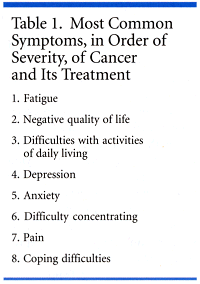Physicians and Patients Rarely Discuss Symptom Distress
BOSTON-Fatigue is a worse problem than pain for most cancer patients but oncologists rarely know this because discussions with patients about symptom distress are typically "don’t ask, don’t tell." Physicians don’t ask, and patients don’t tell, according to Marybeth Singer, MS, RN.
BOSTONFatigue is a worse problem than pain for most cancer patients but oncologists rarely know this because discussions with patients about symptom distress are typically "don’t ask, don’t tell." Physicians don’t ask, and patients don’t tell, according to Marybeth Singer, MS, RN.
This is particularly unfortunate, Ms. Singer noted, because data from a survey of cancer patients at New England Medical Center in Boston, show that just talking to a clinician about symptoms provided some relief of symptom distress for most patients. Ms. Singer serves as nurse practitioner coordinator in the New England Medical Center’s Division of Hematology/Oncology.
"Symptom distress is a major cause of diminished quality of life for persons with cancer, and lack of assessment is a major barrier to treatment," Ms. Singer said. This fact is widely recognized in the pain literature but appears to apply to all of the more common symptoms associated with cancer and cancer treatment.

Most Severe Symptoms
The survey found that fatigue and lack of energy were the most severe symptoms regardless of type of cancer. Pain came in far down the list (see Table 1).
"Lack of energy was the number one symptom regardless of diagnosis," Ms. Singer said. When only symptoms rated 7 or higher on a 1-to-10 scale were considered, lack of energy was again the worst problem, followed by negative quality of life and difficulties with activities of daily living. Although 65% of patients had no symptoms in this severe range, 35% had had least one intense symptom.
Even patients who had severe symptoms rarely discussed them with their physicians. Ms. Singer and colleagues contacted all 47 patients who had at least one symptom with a score worse than 7. They completed telephone interviews with 26 of these 47 patients. Only 29% of patients had discussed the symptoms with their MD or nurse practitioner at their most recent visit.
Interestingly, all of the patients who had such discussions reported being satisfied that some action had been taken to relieve their symptoms, despite evidence from chart reviews that none of their clinicians had changed intervention plans. "If you simply talked with the patients about their symptoms, they felt better," Ms. Singer said. Among the patients who had not discussed symptoms at their last office visit, only 17% felt that anything was being done that would alleviate their symptoms.
Ms. Singer recommended use of a standard symptom assessment tool such as the M. D. Anderson Symptom Index at every visit to monitor cancer patients’ symptoms. Her team will also be testing methylphenidate (Ritalin) and modafinil (Provagil) in pilot studies for treatment of cancer-related fatigue.